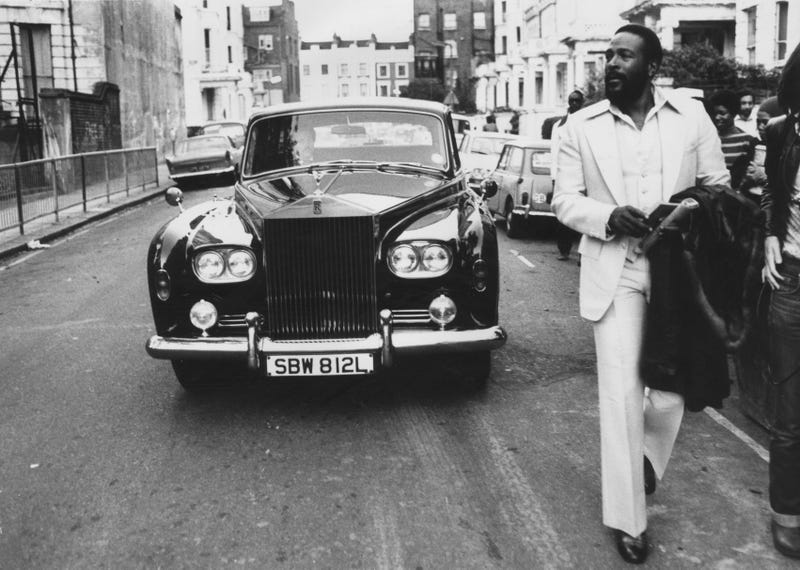
Marvin Pentz Gaye, Jr., dubbed the title "Prince of the Soul", was born in Washington D.C. on April 2, 1939. He grew up under the strict guidance of Gaye's father, Rev. Marvin Gay Sr. Marvin Gaye added the "e" in his last name later in life. During his childhood Marvin Gaye found peace and passion for music. Gaye mastered music by learning to play the piano, and drums at an early age. By high school, his singing experience was limited to church music, but he developed a love for R&B and Doo-Wop, which would lay the groundwork for his career. In the late 1950's, he joined a vocal group called The New Moonglows.

This talented singer was a widely considered unique for having a vocal range that spread across three genres and immediately impressed the group's founder, Harvey Fuqua. Soon after, Gaye and Fuqua started gaining attention from the legendary Berry Gordy Jr. They then signed with Motown Records Gordy. However, Gaye's first solo hit did not come out until 1962, but his early years at Motown were considered a success behind the scenes. He worked with Motown legends such as Little Stevie Wonder, The Supremes, The Marvelettes and Martha and the Vandellas. After his time behind the scenes Gaye decided to take a chance on himself and created his first hit in 1962, Hitch Hike.
In the 1960s, Gaye was producing solo dance songs and producing love ballads with artists such as Diana Ross and Mary Wells. "Can I Get Witness" and "I Heard It Through The Grape Vine" were some of Gaye's biggest hits of the time, and was the "I Heard It Through The Grape Vine" to be Motown's best-selling single in the 1960s. For a short time, Marvin Gaye and Tammi Terrell impressed the masses with their songs such as "Mountain Height Is Not Enough" and "If I Can Do It All Around You". Unfortunately, when Terrell passed away in 1969 due to a developed brain tumor. Their reign as a Royal R&B couple ended. Terrell's death took a huge toll on Gaye to the point where he almost vowed to give up getting on stage ever again.
Inspired by the turmoil and unrest surrounding the Vietnam War in the 1970s, Gaye wrote his famous song "What's Going On." Despite a discussion with Motown about the song’s style, the single was released in 1971 and became an instant success. This smash hit encouraged Gaye to explore music and politics. What's Going On the album released the summer of 1971, the album was the doorway to Marvin Gaye reaching a new audience while keeping his Motown fans. Gaye was artistically unique and created the way for other Motown artists such as Wonder and Michael Jackson in their later years. In addition to influencing artists, the famed album received general praises from the masses, winning the Rolling Stone Album of the Year award.
In 1972, Gaye moved to Los Angeles, inspired by part of his new independence, Gaye wrote one of the most revered love songs in history, "Let's Get It On." The hit song was his second number 1 on the charts, enhancing the appeal to the general public once and for all. Shortly afterwards, Motown pushed Gaye onto tour from the benefit of his most recent success; Reluctantly, he agreed.
For most of the mid-1970s, Gaye toured, collaborated, and produced. He worked with Diana Ross and The Miracles, and he postponed the release of his new solo album until 1976. Gaye continued touring after the release of the album I Want You (1976) and after writing his hit dance single “Got to Give It Up" in 1977, he released his last album for Motown Records in 1978 (Here, My Dear).
After two decades at Motown, Gaye signed with CBS's Columbia Records in 1982. He worked on his latest album, Midnight Love, and its hit single "Sexual Healing", marked a comeback for the R&B star. He won an American Music Award and two Grammy Awards for the song. Despite being on the rise again, Gaye suffered from substance abuse and depression. After his last tour, Marvin Gaye moved back in with his parents, where a tumultuous relationship with his father developed. The pair would often violently fight, which ultimately led to the untimely murder of Marvin Gaye at the hands of his father.
Three years after his death, Marvin Gaye was inducted into the Rock And Roll Hall of Fame. Several decades later Gaye's hit single Got To Give It Up became the center of controversy after Robin Thicke and Pharrell Williams created the hit song Blurred Lines. The Gaye Estate claims the duo committed copy right infringement for taking major elements from the 1977 disco hit. Thicke and Williams both admit to having little to do with the writing and production. The Jury did award the Gaye Estate $7.3 Million for damages, but also said that it does not appear Thicke and Williams intentionally committed infringement.

LISTEN on the Audacy App
FOLLOW US ON ALL SOCIALS
Instagram
Facebook
Twitter
